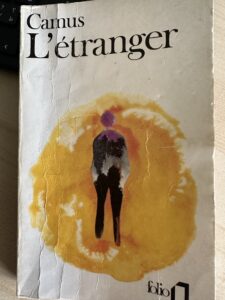
Rereading Albert Camus’ “L’etranger”, his first novel, after almost four decades, is a literary enjoyment: the style, the building of the plot, the vivid descriptions of the characters, the spirit of existentialism that permeates the novel: the total detachment of his feelings towards the burial of his mother-not a tear was dropped, nor any sign of sadness was shown, the doubtful love relationship with Marie, and the refusal to meet the priest who came to his cell to convince him of asking mercy from God after receiving the death penalty for killing an “Arabe” -“c’etait a cause du soleil” -p.158 , he responded to the judge when asked why he killed “le’ Arabe”- The indictment: death penalty :”-le president m’a dit dans une forme bizarre que j’aurais la lete tranche’e sur une place publique au nom du peuple francais”….
Franz Fanon , a year after the death of Camus, wrote the “the Wretched of the Earth”, –Les Damne’s de la Terre-. A huge difference between two literary writers: one is born in Algeria, Camus, but never understood the culture of the people that culminated in REVOLUTION, – while the other, a Martinique writer, left every thing behind to join a revolution against one of the most brutal colonising period in our modern time, and to theorize for the necessity of violence by the colonised, to get rid of 132 years of colonialism that tried unsuccessfully to destroy and uproot any independent aspect of the Algerian People’s culture, history and identity.